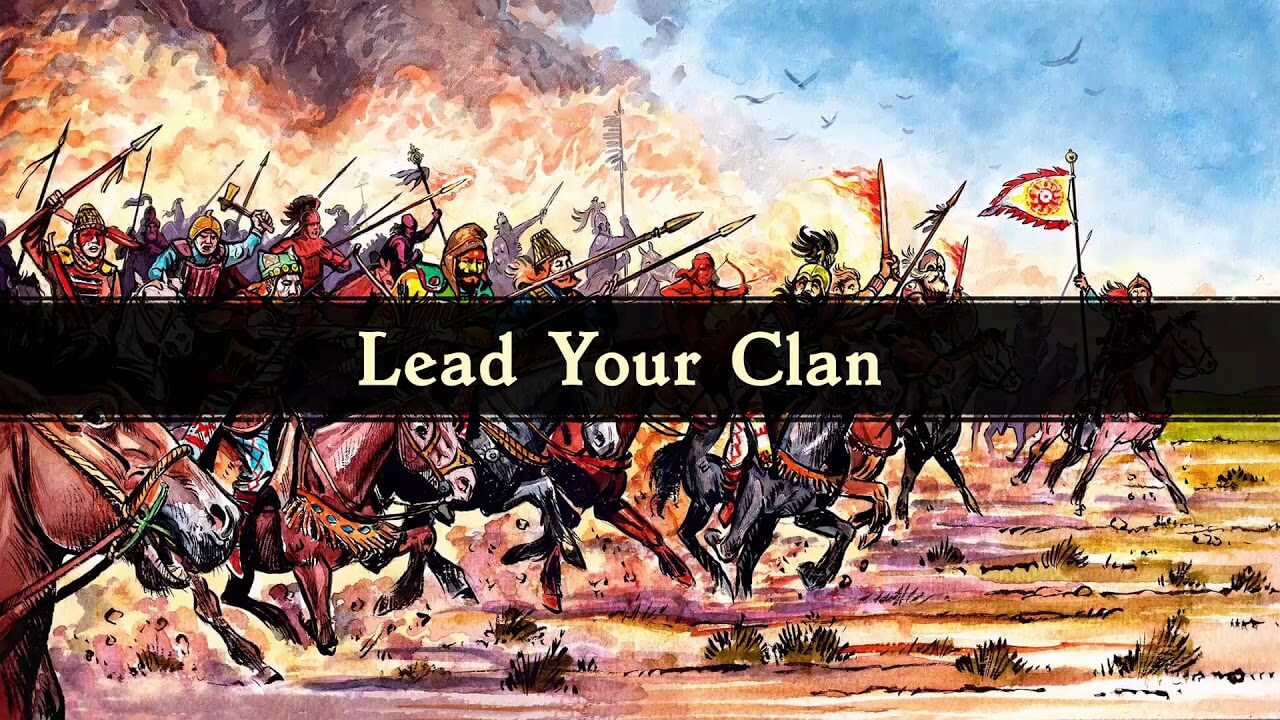To get the most out of a game like Six Ages: Ride Like The Wind one must unlearn contemporary ways of thinking and turn a blind eye to the weird, noisy hyper-world we now inhabit. The world of Six Ages is founded by the mythological conflicts between deities and the tribes and families of humans who now worship them. We as players come along at a time when conflicts of both the physical and supernal realms herald a coming paradigm shift. Through heavy-handed diplomacy, strict resource management, appeasement of the deities, and hundreds of in-game events, Six Ages aims to have the player create his tribe’s own story.
Six Ages eases new players into the world of Glorantha through its clan creation dialogs. My clan’s name is Harsh Tokes. The first task that Six Ages puts forth is determining where your clan fits in. By following the prompts, I did this by shaping my clan’s history. And by shaping my clan’s history I determine the various ways the world will react to Harsh Tokes and how Harsh Tokes reacts to the world. It’s wonderful – A design decision that paints the broadstrokes of Glorantha by making your history a critical part of it.

Once in place, your clan must immediately set out to provide the necessities of life and survival. More than animal husbandry, farming, and diplomacy, there are spiritual matters to be concerned about because the gods and spirits are directly involved in the goings-on of Glorantha. Spending the resources and turns to build a shrine to a particular deity can aid your clan be successful in whichever area that deity is a god of. Likewise, as can using a particular person who is pious to a specific god.
For example, Harsh Tokes needs additional heads of cattle. Winter is only three phases away in yearly cycle (essentially, three turns away). The crops have fared poorly this year bcs we spent the spring turns exploring the surrounding area of my tribe. Harsh Tokes need cattle for milk and meat. Offering tribute to Elmal, god of war, and my clan’s principal deity, can up the chances of a successful herd raid on one of my neighbors. Assigning a worshiper of Elmal as the raid party captain can also help. The catch is that the target tribe are also worshipers of Elmal, who will undoubtedly seek his divine favor when they see our raid party thundering towards their pastures. Who will Elmal favor as the victor? The gods are fickle, but will always decide.

The supernal realm of Glorantha is enmeshed in the physical world through the people of your tribe. Along with the main tribe leader there sits six others in a position of advisory leadership, each belonging to a family and pious towards one of the 14 gods. Some of the advisors yearn for the ‘old ways’, others embrace change. Some no longer worship the classic deities and instead lean towards shamanistic perspectives, finding spirits in all things. This is a divisive lifestyle choice that adds another dimension to the narrative tension that fills this fictional world. Through hundreds of scenarios, each gorgeously and tastefully illustrated, it is up to you to make the best decisions…
And in this sense, one could say Six Ages could easily fit into the RPG category. Each character, including the tribal leader you play as, has some sort of theistic leaning, and each tribe has its own history, customs, prejudices, and ways of survival. You could potentially throw yourself into the role. Or not… Play the chaotic neutral/pragmatic way. Either choice is viable and fun.
In another sense, Six Ages is a turn-based strategy and survival game. Despite one glaring critique (which I shall get to below), it strikes a delicate balance concerning what figures, stats and numbers are available in deciding how best to get your tribe to the endgame.
Each action you take advances the yearly cycle by half of a season. There are no take-backs. No, undo button. The wise clan leader makes timely decisions based on present circumstances and where the cycle of seasons is at and based on the current status of his tribe. Six Ages has a peculiar cadence to its gameplay that may take some time (and playthroughs) to get used to.
How Six Ages presents your clan’s statistics (herd count, goat count, population, inter-clan relationship, etc. etc.) is strong in some areas while lacking in others. From the main administrative screen, information is in no short supply. You’ve got a tally of available troops, goods in-store, how many tribes hate, mock, or fear us. This serves well as an overview, but sometimes I need to get into the nitty-gritty in order to make the best strategic, administrative decision…

Which brings me to my major problem of Six Ages. This game needs a ledger. A universal, administrative clipboard that contains the current, detailed status of my clan and its assets.
Look to history. It’s a familiar motif: In history, every Jarl, Tsar, Sachem, and Akela has an administrative assistant standing by just in the background with scrolls, holographic data tables, bound records, ready to answer his leader’s questions about the realm. Six Ages needs this same service.
Sure, Six Ages has an abbreviated version of a ledger on the main screen and I can get access to diplomacy standings during certain events, but when you are four pages deep into an event and need to make a decision… you are SOL if you want any sort of administrative information.

I want tooltips that itemizes exactly where the sum figure for “Herds” is coming from. I want to a projected estimation of how many “Goods” my tribe will produce. I want a web of diplomacy status of the other clans based on, of course, what our clan currently knows.
An active, dynamic ledger with an ebb and flow of information is what Six Ages needs in order to balance the storytelling with the strategic elements. I want a ledger to be as thorough and up-to-date as my tribe can make it, and I want it to always be accessible – even when I am knee-deep in a story sequence – Pages upon pages into a story. No matter where I am… BOOM my ledger is there.
Colorful and lively. Moody and often surprising. Six Ages: Ride Like the Wind is sure to delight anyone who steps into its world. Despite the wonky handling of information that might be needed to make strategic decisions, the turn-based narrative shines through. Six Ages is a story generator first and a strategic, survival game second. The game has a heart, and it shows.








2 thoughts on “Six Ages: Ride Like the Wind – Review”